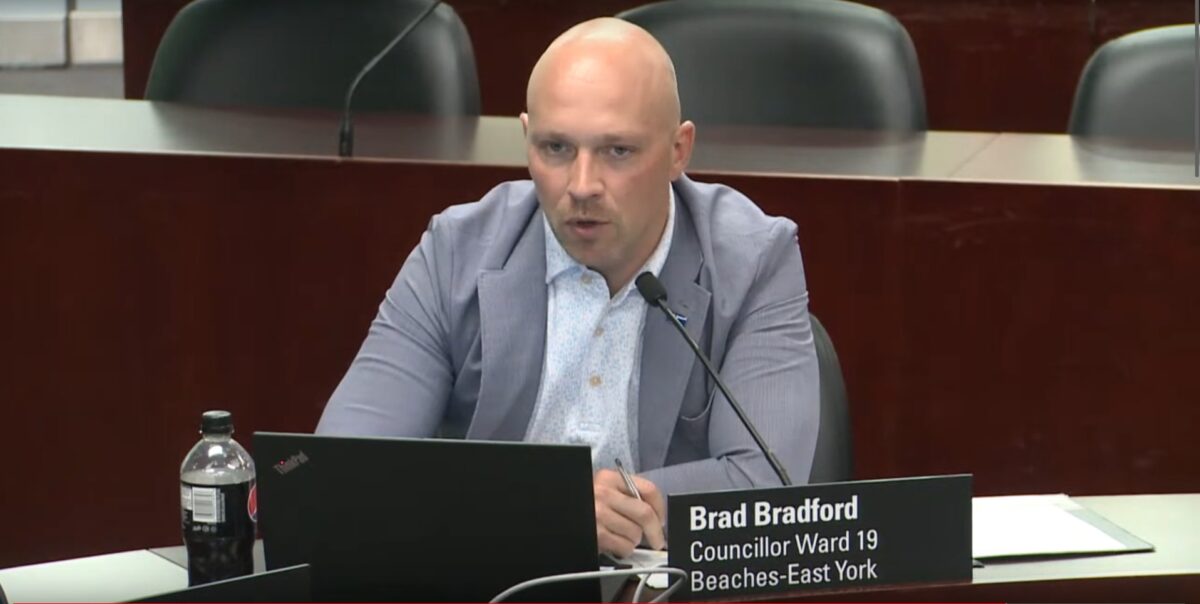This week two Toronto City Councillors will present a motion that poses serious threats to workers’ rights and our democracy. The motion, which would significantly restrict our charter-protected rights to freedom of expression and freedom of assembly, attempts to control where and how working people can use our voices, aims to quell collective action and essentially wishes to silence us.
Politicians have lots of opportunities to communicate with the public. They don’t just sit in their offices; they go to the streets by knocking on doors. We go to the streets by rallying and protesting to communicate publicly about the realities of our workplaces and our communities. Sometimes it’s the only place we can. Why must only our actions be conducted at the convenience of those who hold power? Why should we no longer be allowed to challenge the status quo?
For over a century and half, workers in Toronto have fought back against injustice, challenged anti-black racism and transphobia, and defended human rights to ensure a decent life for us and our grandchildren. As a hotel worker, and as President of the Toronto & York Region Labour Council, I have stood shoulder to shoulder with workers and community members across this region in these struggles.
Last year working people in Canada said “enough is enough” more than any other year since 1986. Through strikes and job actions, we stood up against bosses across the country and fought hard in workplaces, on picket lines, and in the streets to raise wages and working standards across the country. Overwhelmingly, we have seen the politics of hate and division replaced with movements for peace, dignity, and justice for all.
While these and other demonstrations across the country have overwhelmingly remained peaceful, members of councils in Toronto and in York Region have highlighted the infrequent disturbances during the protests, along with a rise in hate crimes, particularly Islamophobic and antisemitic hate crimes, as motivation for their by-laws and motions. We must continue to speak against hate and intolerance, but we cannot allow our fight against hate to turn us against one another and wind back the clock on progress.
Beyond that, what these motions seek to outlaw – hate speech, violence and intimidation – is already illegal. In reality, it is because the protests, pickets, and strikes in the city have been peaceful and lawful that these Councillors, who are frustrated by these events, seek to expand the powers of the police to reign them in.
What angers me even more is that Councillors moving these motions have openly talked about their desire to restrict the ability of unions to engage in protests, one even objecting to a rally held by hospital workers fighting for a new contract after years of sacrifice. We called workers heroes during the pandemic and now some seek to deny them their right to fight for a decent life.
These kinds of restrictions are not new in Toronto. In 2010, during the G20 Summit, thousands of Torontonians were wrongfully held in officially-created protest zones in an attempt to squash our right to free expression and free assembly. Members of my own union were arrested at the same time while they picketed their hotel employer downtown – all in the name of “safeguarding the city.” More than a decade later protestors and my union co-workers won justice in the courts over their mistreatment. We cannot make the same mistake again.
These rights have been hard fought and hard won by generations who came before us during their struggle to build a better society for us all. Some Councillors treat rights like trinkets which can be given and taken freely – like children trading cards at school during recess. The Toronto & York Region Labour Council, which represents over 200,000 working people and 150 union affiliates urges Toronto City Council to reconsider motions like these today and in the future.



